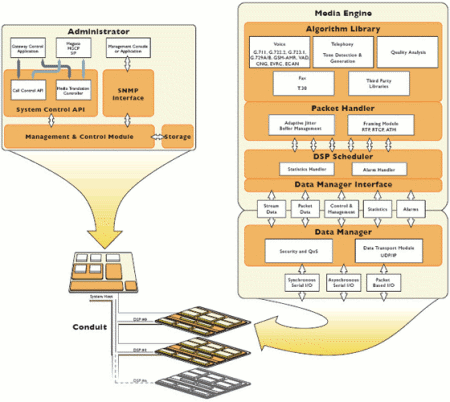Linux VoIP stack gains features, customers
Aug 5, 2005 — by LinuxDevices Staff — from the LinuxDevices Archive — 2 viewsTrinity Convergence has revised its Linux VoIP (voice-over-IP) software stack for PowerQUICC II or x86 host processors and FreeScale StarCore DSPs. VeriCall 4.0 enables transcoding between any combination of TDM and IP networks, and targets wireless gateways, IADs (integrated access devices), IP-PBXs (IP private branch exchanges), and media gateways.
Trinity says VeriCall 4.0 offers a proven, modular, validated, and pre-integrated software platform with an expanded feature set. New features include support for multi-party conferencing and caller ID (CLID), as well as integration with the Freescale MSC8122, a quad-core 16-bit DSP, in addition to other previously supported SC81xx and MSC71xx StarCore DSPs.

VeriCall “Media Engine” and “Administrator” software overview
(Click to enlarge)
VeriCall includes “Media Engine” modules that run on DSPs, an “Administrator” module that runs on PowerQUICC II or x86, and a “Conduit” inter-module communications interface supporing Ethernet or proprietary interconnects, as illustrated in the above diagram.
Additional features include:
- Supports applications from four ports to thousands of channels
- Support for wireless and wireline codecs that include G.711, G.729AB, G.723.1, G.726, GSM-AMR, and EVRC
- Telephony tone support
- Echo cancellation
Trinity says early customers of VeriCall 4.0 include Pannaway Technologies, which will use the stack in its Broadband Access Switch (BASTM) for triple play (voice, video, and data) services, and Quantm Voice Systems, which will deploy VeriCall in its QVS2000TM radio communications dispatch solution.
Trinity also offers a simplified version of VeriCall targeting edge devices without DSPs. That version was announced in September of 2003, and launched first on Linux in May of 2004.
Availability
VeriCall 4.0 is available now, for Linux or VxWorks.
This article was originally published on LinuxDevices.com and has been donated to the open source community by QuinStreet Inc. Please visit LinuxToday.com for up-to-date news and articles about Linux and open source.